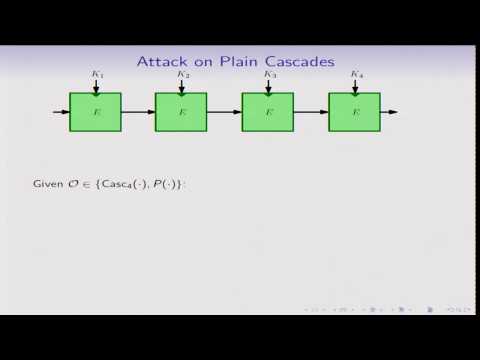Welcome to the resource topic for 2013/019
Title:
Plain versus Randomized Cascading-Based Key-Length Extension for Block Ciphers
Authors: Peter Gaźi
Abstract:Cascading-based constructions represent the predominant approach to the problem of key-length extension for block ciphers. Besides the plain cascade, existing works also consider its modification containing key-whitening steps between the invocations of the block cipher, called randomized cascade or XOR-cascade. We contribute to the understanding of the security of these two designs by giving the following attacks and security proofs, assuming an underlying ideal block cipher with key length k and block length n: - For the plain cascade of odd (resp. even) length l we present a generic attack requiring roughly 2^{k+\frac{l-1}{l+1}n} (resp. 2^{k+\frac{l-2}{l}n}) queries, being a generalization of both the meet-in-the-middle attack on double encryption and the best known attack on triple cascade. - For XOR-cascade of odd (resp. even) length l we prove security up to 2^{k+\frac{l-1}{l+1}n} (resp. 2^{k+\frac{l-2}{l}n}) queries and also an improved bound 2^{k+\frac{l-1}{l}n} for the special case l\in\{3,4\} by relating the problem to the security of key-alternating ciphers in the random-permutation model. - Finally, for a natural class of sequential constructions where block-cipher encryptions are interleaved with key-dependent permutations, we show a generic attack requiring roughly 2^{k+\frac{l-1}{l}n} queries. Since XOR-cascades are sequential, this proves tightness of our above result for XOR-cascades of length l\in\{3,4\} as well as their optimal security within the class of sequential constructions. These results suggest that XOR-cascades achieve a better security/efficiency trade-off than plain cascades and should be preferred.
ePrint: https://eprint.iacr.org/2013/019
Talk: https://www.youtube.com/watch?v=LtIRfnLXhcM
See all topics related to this paper.
Feel free to post resources that are related to this paper below.
Example resources include: implementations, explanation materials, talks, slides, links to previous discussions on other websites.
For more information, see the rules for Resource Topics .
